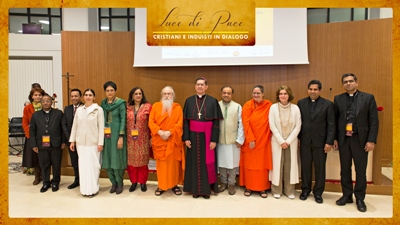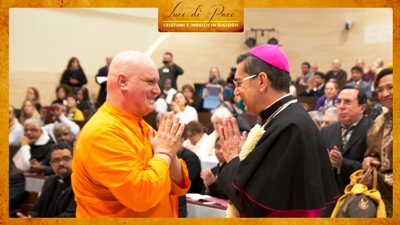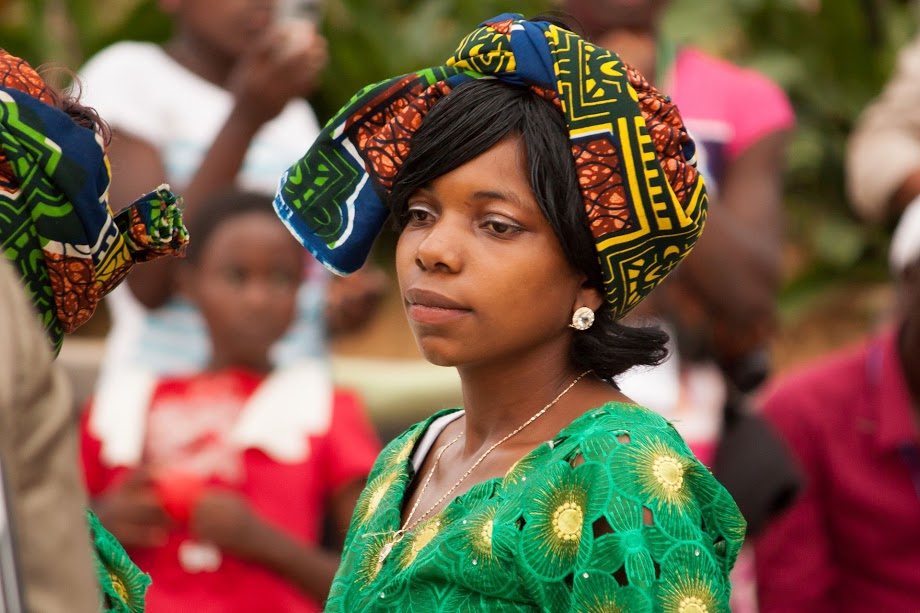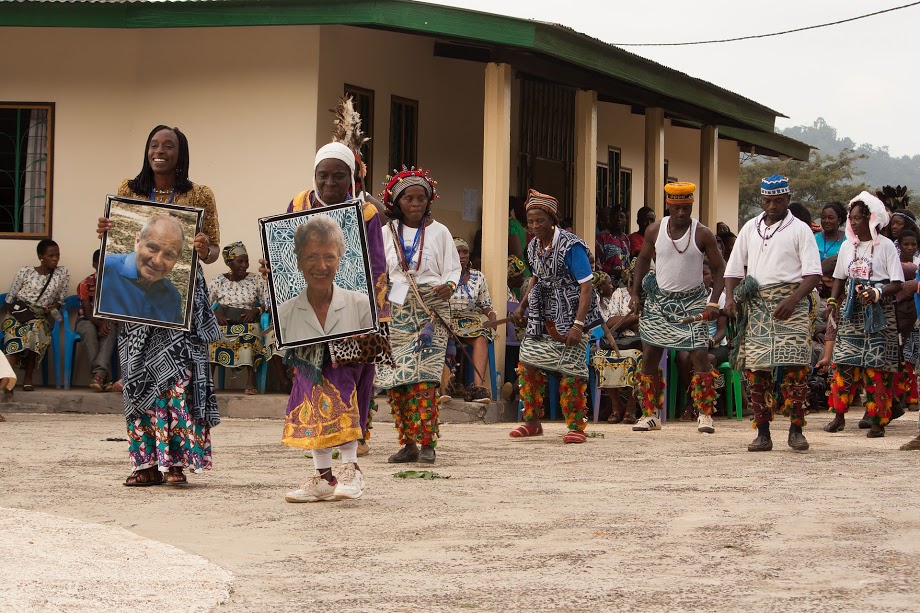
Dec 30, 2016 | Non categorizzato
 “So is craving, so is anger, they arise from the Rajas, the passion of the senses that devours everything” (Bhagavad Gita, 3:37)[1]. These words were chosen by Paramahamsa Svami Yogananda Ghiri, honorary president of the Italian Hindu Union (UII), in his welcome speech at the first Christian-Hindu Conference that crowded the main hall of the Pontifical Gregorian University on December 6, 20016. The conference was opened by Cardinal Jean-Louis Tauran, president of the Pontifical Council for Interreligious Dialogue. He was the promoter of the event in collaboration with the UII, the Italian Bishops Conference, Religions for Peace and the Focolare Movement. The cardinal expressed his joy for this moment of dialogue that was so promising and hopeful: “With our interior light that consumes and illumines, we will be able to direct our every step along the path of Peace.” Christians and Hindus were equally represented by 300 people who were animated by a desire for communion and understanding. Like emblems, a Lamp and Crucifix adorned the hall, both symbols of light. Light and Peace was the title of the day spent in dialogue and in the search of Peace. The words of Bishop Paul Gallagher, Secretary for [Vatican] Relations with States, were quite meaningful. After recalling the many conflicts around the world, he appealed to the international community to “overcome the logic of individualism, competition and the desire to be first” and asked that as soon as possible an “ethic of solidarity” be promoted. The presentation by Dr Naso from Sapienza University of Rome was also very significant. After presenting the data on the conflicts that had begun for religious reasons, he recalled that in many cases it was precisely the faith communities that became mediators in the peace process: in Norther Ireland, South Africa and Mozambique…. This makes one hope that “religions can really play a constructive role in conflict situations.”
“So is craving, so is anger, they arise from the Rajas, the passion of the senses that devours everything” (Bhagavad Gita, 3:37)[1]. These words were chosen by Paramahamsa Svami Yogananda Ghiri, honorary president of the Italian Hindu Union (UII), in his welcome speech at the first Christian-Hindu Conference that crowded the main hall of the Pontifical Gregorian University on December 6, 20016. The conference was opened by Cardinal Jean-Louis Tauran, president of the Pontifical Council for Interreligious Dialogue. He was the promoter of the event in collaboration with the UII, the Italian Bishops Conference, Religions for Peace and the Focolare Movement. The cardinal expressed his joy for this moment of dialogue that was so promising and hopeful: “With our interior light that consumes and illumines, we will be able to direct our every step along the path of Peace.” Christians and Hindus were equally represented by 300 people who were animated by a desire for communion and understanding. Like emblems, a Lamp and Crucifix adorned the hall, both symbols of light. Light and Peace was the title of the day spent in dialogue and in the search of Peace. The words of Bishop Paul Gallagher, Secretary for [Vatican] Relations with States, were quite meaningful. After recalling the many conflicts around the world, he appealed to the international community to “overcome the logic of individualism, competition and the desire to be first” and asked that as soon as possible an “ethic of solidarity” be promoted. The presentation by Dr Naso from Sapienza University of Rome was also very significant. After presenting the data on the conflicts that had begun for religious reasons, he recalled that in many cases it was precisely the faith communities that became mediators in the peace process: in Norther Ireland, South Africa and Mozambique…. This makes one hope that “religions can really play a constructive role in conflict situations.”  The report by Hindu psychologist Sangita Dubey on cultural differences and on the effects of migration on the psyche due to the different diet, language and mentality was lively and supported with personal experiences. “The challenge of dialogue,” stressed Svamini Hamsananda Ghiri (UII) in his presentation of the Hindu perspective, “is fear, indifference, fundamentalism and suspiscion of the other;” to pursue the common good it is necessary to “see the other as a brother and sister because they are generated by a Father God.” Paul Trianni, the University of St. Anselm, who was asked to give a Christian perspective, he concludes: “When two ancient civilizations encounter one another, two such profound spiritualities, they cannot but recognize the great wealth.” Two experiences of dialogue helped gave substance to the words that had been said: Fr Cesare Bovinelli, Camaldolese monk, recalled the great harmony that existed when it came to themes of environment at Assisi. A young person from the Focolare, Aileen Carneiro of India, described the many activities that were carried out between Hindu and Christian youth. Particularly striking was the synergy with the Ghandian Shanti Ashram group of Coimbatore, who started a project for solving poverty, following the approach of the Economy of Communion. Aileen explained that the dialogue of life must be held up, putting into practice the Golden Rule: “Do to others as you would have them do to you.” La Conferenza si è conclusa con uno spazio culturale di poesie, canti e danze sacre indù, in cui l’arte è diventata ulteriore motivo di comunione, degna cornice alla lettura delThe conference ended with presentation of poetry, Hindu sacred dance and song, in which art became a catalyst of communion, a worthy context for the reading of the Joint Statement. Anna Friso [1] (Our translation from Italian)
The report by Hindu psychologist Sangita Dubey on cultural differences and on the effects of migration on the psyche due to the different diet, language and mentality was lively and supported with personal experiences. “The challenge of dialogue,” stressed Svamini Hamsananda Ghiri (UII) in his presentation of the Hindu perspective, “is fear, indifference, fundamentalism and suspiscion of the other;” to pursue the common good it is necessary to “see the other as a brother and sister because they are generated by a Father God.” Paul Trianni, the University of St. Anselm, who was asked to give a Christian perspective, he concludes: “When two ancient civilizations encounter one another, two such profound spiritualities, they cannot but recognize the great wealth.” Two experiences of dialogue helped gave substance to the words that had been said: Fr Cesare Bovinelli, Camaldolese monk, recalled the great harmony that existed when it came to themes of environment at Assisi. A young person from the Focolare, Aileen Carneiro of India, described the many activities that were carried out between Hindu and Christian youth. Particularly striking was the synergy with the Ghandian Shanti Ashram group of Coimbatore, who started a project for solving poverty, following the approach of the Economy of Communion. Aileen explained that the dialogue of life must be held up, putting into practice the Golden Rule: “Do to others as you would have them do to you.” La Conferenza si è conclusa con uno spazio culturale di poesie, canti e danze sacre indù, in cui l’arte è diventata ulteriore motivo di comunione, degna cornice alla lettura delThe conference ended with presentation of poetry, Hindu sacred dance and song, in which art became a catalyst of communion, a worthy context for the reading of the Joint Statement. Anna Friso [1] (Our translation from Italian)
Dec 29, 2016 | Non categorizzato
Dec 28, 2016 | Non categorizzato, Word of
A group of primary school children in Rome tried to put this Word of Life into practice: “Yesterday evening my mother and I went out for a meal with one of my Mum’s friends. I ordered a side dish with the meal, and then I wanted something for dessert. My mother said no. I was about to be angry, but I remembered that Jesus was in my mother so I just smiled instead.” “I went home after a tiring day. While I was watching television my brother took the remote control from me. I was very angry with him, but then I calmed down and let him watch TV.” “Today I answered back angrily when my father spoke to me. I saw that he was not happy about this, so I said sorry, and he forgave me.” Although there may not have been an exact link between the experiences these children told and the Word of Life they were living at the time, the push to love is itself the fruit of the Gospel put into practice. Any Word of Life we set out to live has the same effect. It changes our lives and puts the desire to be attentive to other people’s needs into our hearts, enabling us to be at the service of our brothers and sisters. It could not be otherwise: welcoming the Word and living it gives life to Jesus in us and helps us to act like him. This is what Paul is saying in this letter to the Corinthians. What urged St Paul to announce the Gospel and dedicate himself to the unity of his communities was the deep experience he had had with Jesus. He had felt loved and saved by Jesus, who had entered into his life to the point that nothing and no one could separate him from Jesus again. It was no longer he who lived, because Jesus lived in him. The thought that the Lord had loved him to the point of giving his life astounded Paul and stirred him into action. Its irresistible power urged him to do the same thing with the same love. Does the love of Christ urge us on with the same zeal? If we have truly experienced his love, we cannot fail to love in turn and courageously enter places where there is division, conflict and hatred so as to bring agreement, peace and unity. Love enables us to bring love beyond all obstacles, so as to create real connections with people, through understanding and sharing, and to find solutions together. It is not a question of choosing this or not. Unity must be pursued at all costs, without letting ourselves be hindered by false prudence, by difficulties or by potential clashes. Such an approach is urgently needed above all in ecumenism. This Word of Life has been chosen for this month in which we celebrate the Week of Prayer for Christian Unity. It can be lived together by Christians from different churches and communities so that we will all feel urged on by the love of Christ to seek each other out so as to re- establish unity. When Chiara Lubich spoke at the opening of the Second Ecumenical European Assembly at Graz, Austria on June 23, 1997, she affirmed, “An authentic Christian who wants reconciliation is someone who knows how to love others with God’s own charity, which makes us see Christ in each person, a charity that goes out towards all people (Jesus died for the whole human race). This charity always takes the initiative and enables us to love each person as ourselves, making us one with our brothers and sisters: in sufferings, joys, etc. The Churches too should love with this love.” May we too live the radicality of love with the simplicity and seriousness of those schoolchildren in Rome.
Fr. Fabio Ciardi, OMI
Each month the Focolare offers a Scripture passage as a guide and inspiration for daily living. Ever since the Focolare’s earliest years, founder Chiara Lubich (1920– 2008) wrote her own commentaries each month. Now Fr. Fabio Ciardi, OMI, theologian and close collaborator of Lubich, heads a group of scripture experts who have been entrusted with the task of writing the Word of Life commentaries, reflecting her thoughts and her spirituality of unity. This Word of Life is translated into 96 different languages and reaches several million people worldwide through the media. This monthly leaflet is also a supplement to Living City, the Focolare magazine (livingcitymagazine.com). For information and to subscribe to this leaflet or to the magazine, write to: Living City, 202 Comforter Blvd, Hyde Park, NY 12538; tel: 845-229-0496; e-mail: livingcity@livingcitymagazine.com. Visit focolare.org (international) or focolare.us (U.S.). © 2017 by Living City of the Focolare Movement, Inc. Read more: Lubich, Chiara. The Art of Loving. New City Press: Hyde Park, New York, 2010. Lubich, Chiara. “False Prudence,” Meditations. New City Press: Hyde Park, New York, 2005, p.33.

Dec 27, 2016 | Non categorizzato
Memories, gratitude and commitment were the keypoints of the celebrations in Fontem, Cameroon, for the 50th anniversary of the arrival of several focolarini in the Cameroon forest to begin a work in close harmony with the local Bangwa peo ple. In the opening remarks of civil and traditional authorities, and Focolare co-president Jesús Morán, the importance of those beginnings was remembered as well as the notable development that followed. The method used by the focolarini was also emphasized: dialogue with the local population and its traditional religion. This approach, which is typical of the Focolare, gave rise here and throughout the world to many positive experiences of interreligious dialogue, as Rita Mussallem from the Focolare’s Centre for Dialogue remembered in her address. The keynote address was given by Bishop Nkea Andrew, Bishop of the Mamfe Diocese who, through his own personal experience as a Bangwa, confirmed the precious value of this dialogue and its total conformity to the Gospel. One young Austrian priest who attended the events, commented: “The harmony between the values of African culture and Christian values is quite striking.” On the second day, which was dedicated to testimonies, one of the first nurses and first doctors emphasized how the close collaboration with the local people was a light for providing care to the sick that took into account the needs of both body and spirit. New and lasting friendships were born that brought healing. There were touching testimonies of accompanying people in the final moments of life. This was followed by the testimonies of several ex-students of the College: a police comissioner, a young priest and a nurse. They all said that along with the excellent scientific knowledge, they were also provided the possiblity of discovering those human and spiritual values that now make them happy human beings and appreciated by the Church and society. There was a presentation of the Economy of Communion in Cameroon, a project that will soon be launching an international conference on the continent. The third day was dedicated to giving thanks. Several presentations remembered all those, among the first, who gave their lives for Fontem like Piero Pasolini, Dr Lucio da Soglio, and so on…. Since they considered the others to be their equals, their work was marked by reciprocity and not assistenzialism. This was followed by traditional dances from five Fondoms (territories) that comprise Lebialem Division. More than 2,500 people were then served lunch thanks to the love of many “mamme” who had worked tirelessly, day and night, in the days leading up to the event. In the evening, there was a very moving musical presented by the children and students, which recounted the story of Fontem.
ple. In the opening remarks of civil and traditional authorities, and Focolare co-president Jesús Morán, the importance of those beginnings was remembered as well as the notable development that followed. The method used by the focolarini was also emphasized: dialogue with the local population and its traditional religion. This approach, which is typical of the Focolare, gave rise here and throughout the world to many positive experiences of interreligious dialogue, as Rita Mussallem from the Focolare’s Centre for Dialogue remembered in her address. The keynote address was given by Bishop Nkea Andrew, Bishop of the Mamfe Diocese who, through his own personal experience as a Bangwa, confirmed the precious value of this dialogue and its total conformity to the Gospel. One young Austrian priest who attended the events, commented: “The harmony between the values of African culture and Christian values is quite striking.” On the second day, which was dedicated to testimonies, one of the first nurses and first doctors emphasized how the close collaboration with the local people was a light for providing care to the sick that took into account the needs of both body and spirit. New and lasting friendships were born that brought healing. There were touching testimonies of accompanying people in the final moments of life. This was followed by the testimonies of several ex-students of the College: a police comissioner, a young priest and a nurse. They all said that along with the excellent scientific knowledge, they were also provided the possiblity of discovering those human and spiritual values that now make them happy human beings and appreciated by the Church and society. There was a presentation of the Economy of Communion in Cameroon, a project that will soon be launching an international conference on the continent. The third day was dedicated to giving thanks. Several presentations remembered all those, among the first, who gave their lives for Fontem like Piero Pasolini, Dr Lucio da Soglio, and so on…. Since they considered the others to be their equals, their work was marked by reciprocity and not assistenzialism. This was followed by traditional dances from five Fondoms (territories) that comprise Lebialem Division. More than 2,500 people were then served lunch thanks to the love of many “mamme” who had worked tirelessly, day and night, in the days leading up to the event. In the evening, there was a very moving musical presented by the children and students, which recounted the story of Fontem. On the fourth day, the presence of Our Lady Seat of Wisdom College in Fontem was celebrated. The bishop of Mamfe exhorted the many ex-students who had come from many countries of the world, to be aware of the gifts they had received and have made them ambassadors of unity wherever they may go. Charles Tasong, who was among the first Bangwa to know the Focolare commented: “During the Cry Die (commemorating Lucio Soglio, Lino D’armi and Doris Ronacher, who died recently after spending all their energy on Fontem), I realized that there is no longer the Focolare and the Bangwa; no longer the whites on one side, the blacks on the other – but one family. I want to embrace the challenge of bringing forward in my own life the powerful reality of unity that we experienced here in Fontem.” Biagio Sparapano
On the fourth day, the presence of Our Lady Seat of Wisdom College in Fontem was celebrated. The bishop of Mamfe exhorted the many ex-students who had come from many countries of the world, to be aware of the gifts they had received and have made them ambassadors of unity wherever they may go. Charles Tasong, who was among the first Bangwa to know the Focolare commented: “During the Cry Die (commemorating Lucio Soglio, Lino D’armi and Doris Ronacher, who died recently after spending all their energy on Fontem), I realized that there is no longer the Focolare and the Bangwa; no longer the whites on one side, the blacks on the other – but one family. I want to embrace the challenge of bringing forward in my own life the powerful reality of unity that we experienced here in Fontem.” Biagio Sparapano
Dec 26, 2016 | Non categorizzato
https://vimeo.com/195193687 It all started with a group of young girls and a green drum kit … The spark that gave life to Gen Verde was something unusual not so much because of the green drum kit but the wish that came with it… “to make a lot of noise”. That’s right. Blast it out, making the ideal of unity heard by all through music and performances, that is the soul of our whole life. That spark sped off, reaching all corners of the world and touching countless lives. Unity is best expressed when we sing it together. That’s what they wanted to say through this song. It tells it like it is. That message is just as relevant today as it was 50 years ago when it all began: each one of us is a spark. So let’s stand up, wherever we are, and turn up the volume of unity. Gen Verde – International Performing Arts Group Gen Rosso International Performing Arts Group

Dec 24, 2016 | Non categorizzato
 Christmas, Christmas, how often have we celebrated you with pure joy and unmatched ardour! But you find our hearts so frozen by the coldness of this world, that you cannot touch them as you would with your mysterious extraordinary message: GOD LOVES US, one by one and all together. This Love wrapped us round so completely that the Blessed Trinity resolved to send among us the Son of God made man, so our brief sojourn on this earth could be illuminated from now on by the Light that does not fade, and the absurdity of death in this life be transformed into a simple passing into life more full and eternal! We hope this year at least, that You, Christmas, may say to our hearts all you wish to say and find us ready, here and now to hear your voice.
Christmas, Christmas, how often have we celebrated you with pure joy and unmatched ardour! But you find our hearts so frozen by the coldness of this world, that you cannot touch them as you would with your mysterious extraordinary message: GOD LOVES US, one by one and all together. This Love wrapped us round so completely that the Blessed Trinity resolved to send among us the Son of God made man, so our brief sojourn on this earth could be illuminated from now on by the Light that does not fade, and the absurdity of death in this life be transformed into a simple passing into life more full and eternal! We hope this year at least, that You, Christmas, may say to our hearts all you wish to say and find us ready, here and now to hear your voice.

 “So is craving, so is anger, they arise from the Rajas, the passion of the senses that devours everything” (Bhagavad Gita, 3:37)[1]. These words were chosen by Paramahamsa Svami Yogananda Ghiri, honorary president of the Italian Hindu Union (UII), in his welcome speech at the first Christian-Hindu Conference that crowded the main hall of the Pontifical Gregorian University on December 6, 20016. The conference was opened by Cardinal Jean-Louis Tauran, president of the Pontifical Council for Interreligious Dialogue. He was the promoter of the event in collaboration with the UII, the Italian Bishops Conference, Religions for Peace and the Focolare Movement. The cardinal expressed his joy for this moment of dialogue that was so promising and hopeful: “With our interior light that consumes and illumines, we will be able to direct our every step along the path of Peace.” Christians and Hindus were equally represented by 300 people who were animated by a desire for communion and understanding. Like emblems, a Lamp and Crucifix adorned the hall, both symbols of light. Light and Peace was the title of the day spent in dialogue and in the search of Peace. The words of Bishop Paul Gallagher, Secretary for [Vatican] Relations with States, were quite meaningful. After recalling the many conflicts around the world, he appealed to the international community to “overcome the logic of individualism, competition and the desire to be first” and asked that as soon as possible an “ethic of solidarity” be promoted. The presentation by Dr Naso from Sapienza University of Rome was also very significant. After presenting the data on the conflicts that had begun for religious reasons, he recalled that in many cases it was precisely the faith communities that became mediators in the peace process: in Norther Ireland, South Africa and Mozambique…. This makes one hope that “religions can really play a constructive role in conflict situations.”
“So is craving, so is anger, they arise from the Rajas, the passion of the senses that devours everything” (Bhagavad Gita, 3:37)[1]. These words were chosen by Paramahamsa Svami Yogananda Ghiri, honorary president of the Italian Hindu Union (UII), in his welcome speech at the first Christian-Hindu Conference that crowded the main hall of the Pontifical Gregorian University on December 6, 20016. The conference was opened by Cardinal Jean-Louis Tauran, president of the Pontifical Council for Interreligious Dialogue. He was the promoter of the event in collaboration with the UII, the Italian Bishops Conference, Religions for Peace and the Focolare Movement. The cardinal expressed his joy for this moment of dialogue that was so promising and hopeful: “With our interior light that consumes and illumines, we will be able to direct our every step along the path of Peace.” Christians and Hindus were equally represented by 300 people who were animated by a desire for communion and understanding. Like emblems, a Lamp and Crucifix adorned the hall, both symbols of light. Light and Peace was the title of the day spent in dialogue and in the search of Peace. The words of Bishop Paul Gallagher, Secretary for [Vatican] Relations with States, were quite meaningful. After recalling the many conflicts around the world, he appealed to the international community to “overcome the logic of individualism, competition and the desire to be first” and asked that as soon as possible an “ethic of solidarity” be promoted. The presentation by Dr Naso from Sapienza University of Rome was also very significant. After presenting the data on the conflicts that had begun for religious reasons, he recalled that in many cases it was precisely the faith communities that became mediators in the peace process: in Norther Ireland, South Africa and Mozambique…. This makes one hope that “religions can really play a constructive role in conflict situations.”  The report by Hindu psychologist Sangita Dubey on cultural differences and on the effects of migration on the psyche due to the different diet, language and mentality was lively and supported with personal experiences. “The challenge of dialogue,” stressed Svamini Hamsananda Ghiri (UII) in his presentation of the Hindu perspective, “is fear, indifference, fundamentalism and suspiscion of the other;” to pursue the common good it is necessary to “see the other as a brother and sister because they are generated by a Father God.” Paul Trianni, the University of St. Anselm, who was asked to give a Christian perspective, he concludes: “When two ancient civilizations encounter one another, two such profound spiritualities, they cannot but recognize the great wealth.” Two experiences of dialogue helped gave substance to the words that had been said: Fr Cesare Bovinelli, Camaldolese monk, recalled the great harmony that existed when it came to themes of environment at Assisi. A young person from the Focolare, Aileen Carneiro of India, described the many activities that were carried out between Hindu and Christian youth. Particularly striking was the synergy with the Ghandian Shanti Ashram group of Coimbatore, who started a project for solving poverty, following the approach of the Economy of Communion. Aileen explained that the dialogue of life must be held up, putting into practice the Golden Rule: “Do to others as you would have them do to you.” La Conferenza si è conclusa con uno spazio culturale di poesie, canti e danze sacre indù, in cui l’arte è diventata ulteriore motivo di comunione, degna cornice alla lettura delThe conference ended with presentation of poetry, Hindu sacred dance and song, in which art became a catalyst of communion, a worthy context for the reading of the Joint Statement. Anna Friso [1] (Our translation from Italian)
The report by Hindu psychologist Sangita Dubey on cultural differences and on the effects of migration on the psyche due to the different diet, language and mentality was lively and supported with personal experiences. “The challenge of dialogue,” stressed Svamini Hamsananda Ghiri (UII) in his presentation of the Hindu perspective, “is fear, indifference, fundamentalism and suspiscion of the other;” to pursue the common good it is necessary to “see the other as a brother and sister because they are generated by a Father God.” Paul Trianni, the University of St. Anselm, who was asked to give a Christian perspective, he concludes: “When two ancient civilizations encounter one another, two such profound spiritualities, they cannot but recognize the great wealth.” Two experiences of dialogue helped gave substance to the words that had been said: Fr Cesare Bovinelli, Camaldolese monk, recalled the great harmony that existed when it came to themes of environment at Assisi. A young person from the Focolare, Aileen Carneiro of India, described the many activities that were carried out between Hindu and Christian youth. Particularly striking was the synergy with the Ghandian Shanti Ashram group of Coimbatore, who started a project for solving poverty, following the approach of the Economy of Communion. Aileen explained that the dialogue of life must be held up, putting into practice the Golden Rule: “Do to others as you would have them do to you.” La Conferenza si è conclusa con uno spazio culturale di poesie, canti e danze sacre indù, in cui l’arte è diventata ulteriore motivo di comunione, degna cornice alla lettura delThe conference ended with presentation of poetry, Hindu sacred dance and song, in which art became a catalyst of communion, a worthy context for the reading of the Joint Statement. Anna Friso [1] (Our translation from Italian)


